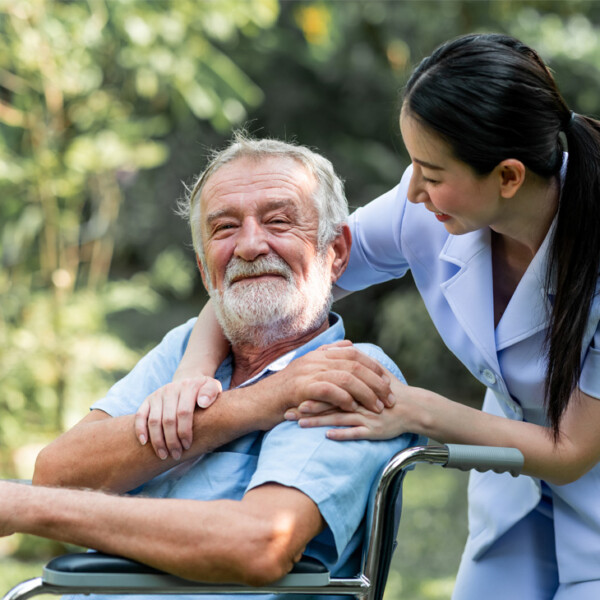Three key messages about emotional wellbeing after cancer:
-
- It is normal to experience a range of emotions after treatment for cancer has finished.
- Seeking support can help you acknowledge and process some of these emotions.
- Cancer Council WA can provide you with emotional support through 13 11 20, Metro and Regional Cancer Support Coordinators, Network Counsellors, and Wellbeing after Cancer health professionals.
Cancer can be a life changing experience and it is normal to feel many different emotions during and after treatment. Feelings of relief, isolation, uncertainty, worry, sadness, and anger are all common.
Navigating life after cancer treatment can present its own challenges and you may even have mixed feelings when treatment ends. Individuals often feel safer when they are closely monitored by the treatment team and may feel a bit lost when they do not see them as often. This is a common feeling, and our Wellbeing after Cancer health professionals can support you during this time as you adjust to your life after cancer treatment.
It is important to allow yourself time to adapt to physical and emotional changes, establish a new daily routine at your own pace, and seek support if you need it. Learning to acknowledge your feelings and taking time to process them is an important part of emotional wellbeing after cancer.
Cancer Council’s Emotions and Cancer booklet provides information about the emotional impact of cancer.
Fear of recurrence
Focus on what you can control, for example, being involved in your follow-up appointments and making healthy changes to your lifestyle. Recognise the signs of distress, such as feeling anxious or sad, repetitive negative thoughts or disturbed sleep.
Knowing what your distress level is (on a scale of 1-10, with 10 being the highest distress) can be helpful in identifying what’s worrying you. The Distress Thermometer can be a useful tool to check in with how you’re feeling. This can help guide the conversation with one of our health professionals as you seek support, or even to check in with yourself from week to week.
If your level of distress is high and impacting your daily life, seek support from your GP, treatment team or call our 13 11 20 Cancer Information and Support Line to discuss your concerns.
Cancer Council’s Webinar Fear of Cancer Coming Back provides strategies to help manage emotions related to fear of recurrence.
Social support has been found to reduce distress related to fear of recurrence. It can be helpful to talk with others who have also gone through cancer treatment. Although everyone has a different experience, many of the emotions are similar. Social support provides an opportunity to share experiences, learn from and connect with others.
Options for social support:
- Join a Cancer Support Group which can be face-to-face, online or via phone
- Join the Cancer Council Online Community
- Sign up for a Life Now exercise and meditative course
Family and friends
When cancer treatment ends, family and friends may not fully understand that you could still need support or that some symptoms can persist for long periods of time. It may be helpful to tell your loved ones that the cancer experience does not stop when treatment ends and that your recovery is ongoing. You may need time to adjust to your ‘new normal’ and reflect on what you have been through.
Research shows that carers often experience high levels of distress, even when cancer treatment has finished for their loved one. Carers and family members are encouraged to ring Cancer Council WA’s 13 11 20 Cancer Information and Support Line for emotional support and practical information.
Cancer Council’s Caring for Someone with Cancer booklet provides information and practical tips for family, friends and carers of someone with cancer.
Cancer Council Life Now Program
Life Now facilitates individuals affected by cancer to experience the benefits of keeping mentally and physically active. Our Mindfulness, Mindful Art, Meditation, Tai Chi, Yoga and Exercise courses introduce healthy activities in a safe and supportive group environment. Our programs are designed to empower participants with valuable skills and techniques that can be used to help manage stress and other cancer-related symptoms.
For more information about our Life Now Program, call our 13 11 20 Cancer Information and Support Line or visit the Life Now page.
Complementary therapies
Complementary therapies such as Reflexology, Massage, and Reiki can be helpful during and after cancer treatment. Such therapies may help individuals cope better with symptoms of cancer and treatment side effects such as fatigue, nausea, and pain.
Before starting any complementary therapies, it is important to speak to your doctor and follow their advice. For more information about complementary therapies, call our 13 11 20 Cancer Information and Support Line or visit our complementary therapies page.
Useful resources and links
Resources, including booklets, podcasts and webinars, can be found on our Publications for Patients, family and friends page. Examples include:
-
- Emotions and Cancer booklet
- Life Now Meditation and Relaxation CD
- Living Well After Cancer booklet
- Living with Advanced Cancer booklet
- The Act-Belong-Commit guidelines for positive mental health provide a simple approach you can adopt to become more mentally healthy.
- Australian Music Therapy Association can provide contacts of professional music therapists. Music therapy is a research-based allied health profession in which music is used to actively support people as they aim to improve their health, functioning and well-being.
- ANZACATA is the peak professional body representing creative arts therapists in Australia, New Zealand and the Asia/Pacific region.
The expert content on this page has been informed by Iris Barten, Accredited Mental Health Social Worker (AMHSW) private practice practitioner and Australian Association of Social Workers (AASW) member. Iris has been involved in Social Work in WA since graduating in 2004 as a mature aged student. She has worked in health care and currently combines her private practice work as a supervisor with AMHSW and working part-time in an acute hospital setting.
